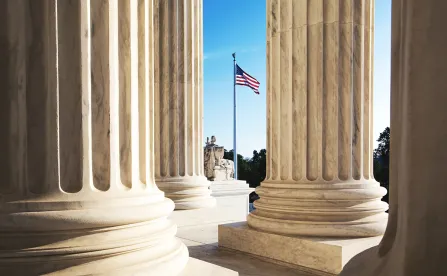Go-To Guide
- The U.S. Supreme Court heard oral arguments in Consumer Financial Protection Bureau (CFPB) Community Financial Services Association of America (CFSA), which raises the question of whether the CFPB’s funding structure, by which it requests and receives funding directly from the Federal Reserve rather than via a congressional appropriation, violates the U.S. Constitution’s Appropriations Clause and, if so, what the appropriate remedy should be.
- Several justices appeared skeptical of the CFSA’s argument that the CFPB’s funding structure violates the Appropriations Clause. But if the Supreme Court affirms the Fifth Circuit’s earlier decision holding that the CFPB’s funding structure is unconstitutional, the CFPB’s past efforts, including its rulemaking efforts and enforcement actions, may be in jeopardy.
- The Court will issue a decision in the case before the end of its term in June 2024.
On Oct. 3, 2023, the U.S. Supreme Court heard oral arguments in Consumer Financial Protection Bureau (CFPB) v. Community Financial Services Association of America (CFSA) (Docket No. 22-448), a case that raises the question of whether the CFPB’s funding structure, by which it receives funding directly from the Federal Reserve rather than via a congressional appropriation, violates the U.S. Constitution’s Appropriations Clause and, if so, what the appropriate remedy should be.
Given the importance of this case, this blog post summarizes the parties’ arguments and highlights key points the Court and the parties made during oral argument.
Background
In 2022, the U.S. Court of Appeals for the Fifth Circuit held that the CFPB’s funding structure violates the U.S. Constitution’s Appropriations Clause as well as its structural separation of powers. The Fifth Circuit noted that, under the Dodd-Frank Act, the CFPB requests and receives funding directly from the Federal Reserve, rather than via annual appropriations from Congress. The Fifth Circuit then opined that, with the CFPB’s funding structure as enshrined in the Dodd-Frank Act, Congress violated the Appropriations Clause by exempting the CFPB from annual or other time-limited appropriations or reviews, and thus also violated the Constitution’s structural separation of powers by effectively ceding all direct and indirect control over the agency.
Before the Supreme Court, the CFPB argued that the Fifth Circuit erred because the Appropriations Clause’s text does not limit Congress’s authority to determine the specificity, duration, and source of appropriations. It also argued that that “natural reading” of the Constitution’s text is reinforced by longstanding practice, noting that Congress, since the founding, has made lump-sum and standing appropriation and also funded agencies through fees, assessments, investments, and other similar sources. Given the text and history, the CFPB argued that its funding structure is constitutionally sound because the Dodd-Frank Act caps the amount of funding the agency may receive each year from the earnings of the Federal Reserve System and specifies how those funds may be used.
The CFSA, for its part, argued that the CFPB’s funding structure violates the Appropriations Clause because Congress crafted the agency to operate free of any political accountability, including any fiscal oversight. The CFSA argued that the CFPB’s reading of the Appropriations Clause was flawed, providing no limiting principle that would prevent Congress from giving the President a blank check payable each year, and that history does not in fact support the CFPB’s expansive reading of the Appropriations Clause. Summarizing all that during oral argument in response to a question from Justice Thomas, the CFSA argued that the CFPB’s funding structure is unconstitutional “[b]ecause Congress has not determined the amount this agency should be spending. Instead, it has delegated to the Director the authority to pick his own appropriation, subject only to an upper limit that is so — so high it is rarely meaningful.”
Several of the Justices, however, seemed skeptical of the CFSA’s arguments, with Justice Kagan pointing out that $600 million, the CFPB’s initial funding cap, is a “rounding error” in the federal budget, and noting too that the CFSA’s argument that the Appropriations Clause demands annual line-item appropriations is “flying in the face of 250 years of history.”
Key Takeaways from the Oral Arguments
Given the potentially profound implications of this case, summarized below are other key takeaways from the Oct. 3 oral argument before the Court.
Separation of Powers. While the CFPB argued that Congress’s funding of the CFPB meets the test of text and history for separation of powers cases, the CFSA argued that the Appropriations Clause is not merely a privilege of Congress, but rather a duty to check the executive branch.
Chief Justice Roberts responded to those arguments by noting that he “didn’t see any particularly compelling analogues” to the CFPB’s funding structure, and that “a very aggressive view of Congress’s authority under the Appropriations Clause” could enable Congress to “empower[] the President in a way that might seem unusual to the Framers.”
Joining in, Justice Thomas noted that Congress’s authority to appropriate funds acts structurally as a check on the executive branch: “It seems to [me] that at least when I did – was in the executive branch, that Congress exercised appropriation [authority] to check the executive brank to some extent.”
While not rejecting that point, Justice Jackson noted that the Appropriations Clause “seems to give the legislature the prerogative of the purse,” but that with the CFPB’s funding structure “we have a statute in which the legislature has exercised that” prerogative.
Limiting Principle. The topic of limiting principles came up frequently—that is, what sort of limits, if any, the Appropriations Clause imposes on Congress’s authority to appropriate funds.
Signaling the Court’s concerns regarding whether the Appropriations Clause imposes any limits on Congress, Justice Thomas—with the first question posed during the oral argument—asked the CFPB counsel whether “there are any limits on what Congress can do” in relation to appropriations. In response, the CFPB’s counsel argued that Congress, with respect to any appropriation, must only specify “the source and the purpose of the funding,” but also conceded that history could be important to the analysis, if the Court were presented with “some kind of funding statute or arrangement that’s never been done in all of this nation’s history.”
Justice Gorsuch, for his part, was concerned to know whether the statutory cap on the CFPB’s funding, which the CFPB has never reached, was critical to the CFPB’s argument, asking “what role the upper limit plays” in the CFPB’s theory of the case. In response, the CFPB’s counsel conceded that, under its view of the Appropriations Clause, it didn’t “think that Congress would have to provide a – a statutory specified amount, but they would, of course, have to specify the purpose of the funding.” Taking that position on, the CFSA’s counsel argued that “there has to be some kind of upper limit, and if there is an upper limit, it’s got to be meaningful.”
Those sorts of comments provoked a series of hypotheticals, with Justice Gorsuch asking whether, if Congress merely specified the source and purpose of funding for a particular agency, the President “could take a trillion dollars if – if he wished to do so.” Justice Kagan then asked whether Congress could craft “a standing appropriation of up to a quadrillion dollar for the President to fund as he deems fit for the entire federal government.” And in response, the CFPB’s counsel acknowledged that, “if the Court were confronted with that issue in a future case, it could well recognize limits and the limits would come from history.”
Remedies. The Court did not focus much of the oral argument on what remedy would be appropriate if it held that the CFPB’s funding structure violates the Appropriations Clause. In fact, Justice Sotomayor highlighted that fact, noting that “it might be a good sign or a bad sign, I don’t know. Nobody’s talked about remedy.” She then introduced the topic, asking the CFPB’s counsel whether the Fifth Circuit erred in “striking down basically not just this Payday Lending Rule but basically saying anything this agency’s done since the beginning is invalid.”
In response to that line of questioning, the CFPB’s counsel argued that the Fifth Circuit’s “sweeping retrospective remedy . . . conflicts with both severability principles and traditional remedial equitable principles in this space.” Taking that position on, the CFSA’s counsel argued the CFPB’s funding structure is “not severable,” as it would require the Court to “essentially pull out a white piece of paper and start on your own.” Instead, the CFSA’s counsel urged the Court to uphold the Fifth Circuit’s ruling and require Congress “to make a valid appropriation,” noting that the Court could stay its judgment to facilitate Congress’s efforts, and that “when Congress adopts a valid appropriation, it can [also] ratify whatever [CFPB] rules and regulations it wants to ratify.”
Key Takeaways
It is difficult to know which way the Supreme Court is leaning, given the tone and substance of the questions asked during oral arguments. All that is certain is that the Supreme Court will issue a ruling before the end of its term in June 2024. In the interim, there may be more Appropriations Clause based challenges to CFPB rulemaking and other activities, with the Fifth Circuit likely the venue of choice. Depending on the outcome of this case, other federal agencies and programs with permanent appropriations may also come under scrutiny, such as Social Security, the Smithsonian, the Federal Reserve, the Federal Deposit Insurance Corporation, and the Office of the Comptroller of the Currency.
Tessa Cierny also contributed to this article.
Zeba Pirani also contributed to this article.




 />i
/>i
